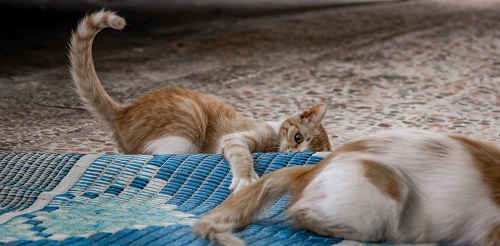Before or after eating or drinking, your kitten or cat may paw, scratch, or knead the floor as if digging or burying something. There’s nothing wrong with your cat; this isn’t unusual behavior. In reality, your pet is displaying an impulse that is shared by even the biggest cats, and it is a very good sign that it is at peace in your home. You can, however, take simple actions to change the behavior if you find it unpleasant or disruptive.
What Is Cat Floor Pawing?
Before or after eating, many cats scratch, paw, or knead the ground surrounding their food bowl. Pawing and digging are both instinctual behaviors, which means your cat didn’t learn them from its mother. Some cats can go to extremes, scratching the floor or kneading the carpet around their eating bowl. Cats have been known to drag things such as towels over their food dishes.
Food Storing, Protection, and Disposing of food
Feral cats in the wild frequently bury their food remains (as well as their feces) as a warning to predators: buried food has little smell and does not attract hunters or predators. If they’re females, they’ll continue to feed their kittens to keep other cats from finding their litter. Unneutered male cats will often spread urine around their area to warn other predators to stay away. (Have your cat neutered at an appropriate age so he doesn’t mark his territory with urine.)
This is a behavior seen in cats all over the world. It’s comparable to what big cats do with their “food caching.” The leopard is well known for food caching or storing food high up in trees to keep lions away. This protective behavior is also seen in the North American bobcat, which hides the remains of its victim with trash to avoid being discovered by other animals.
You may observe your cat scratching under the plate, tearing the newspapers, and even putting them over the food bowl to totally hide it if you put newspapers under the food plates. Another sort of “food caching».
Cats will scratch or hide food or other items they dislike in some cases. Burying feces in a litter box or on the ground is similar behavior. Burying, like caching, allows the cat to “hide” by removing its waste. Furthermore, because cats generally sleep where they eat, burying feces can help to keep a cat’s private space clean.
It may appear illogical that a home cat with no threat of their food being taken would act this way. Except for the fact that this behavior is natural and cats do it spontaneously, it makes no sense.
Kneading on the Floor
Kneading is a sign of joy, despite its similarity to pawing. Cats and kittens will massage each other by gently alternating their paws, similar to how a person might rub another’s back. Kneading is a sign of satisfaction, and your cat may be anticipating a happy experience when it kneads its paws (such as eating a meal). If the area around the food bowl is soft, kneading is more likely (a carpet, for example).
How to stop Your Pawing or Kneading on the Floor?
Pawing and kneading aren’t dangerous. It will not hurt your cat, and it is unlikely to harm you. In fact, some cat owners found it cute and adorable
If your pet tears up documents or destroys your carpet, on the other hand, it can be annoying and cause a mess. You can take a few actions to control this behavior if you believe it is a problem:
- To cover the bowl, place the food on a hard surface away from anything that could be damaged or dragged.
- Keep an eye on your cat while it eats, and take away the food bowl once it is finished. Wet food should be stored away within a few minutes if it hasn’t been completely consumed, as it can easily spoil.
- Distract your cat from pawing the floor with a toy or game.
- Dry cat food should not be left out for “free grazing,” because this will encourage pawing.
Scratching or kneading is a natural habit that is not dangerous, so don’t punish your cat for it. Punishing your cat by hitting or beating him with something might lead to more bad behavior and make it difficult for you and your cat to connect. If you feel your pet is sick by repeating this annoying habit, contact your veterinarian right away. Always consult your veterinarian for health-related concerns, as they have examined your pet, are familiar with the pet’s medical history, and can provide the best suggestions for your kitten




